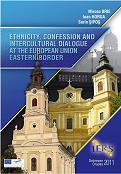
INTERETHNIC RELATIONS STABILITY ON THE UKRAINE-ROMANIA BORDER: A CASE OF CHERNIVTSI REGION
INTERETHNIC RELATIONS STABILITY ON THE UKRAINE-ROMANIA BORDER: A CASE OF CHERNIVTSI REGION
Keywords: Bukovyna; ethnic relations; culture of tolerance; borderland.
Situation with interethnic relations on the border of Romania and Ukraine is subjected to changes, especially after Romania accession to the EU. The most characteristic features of it could be analyzed on the example of Ukrainian part of Bukovina. This article considers first of all two aspects of Bukovynian regional phenomenon of ethnic tolerance: historical and contemporaneous ones. First part of the article proposes a brief historic retrospect, evaluating main stages of this multiethnic regional society phenomenon formation and evolution. And the second part regards current challenges of culture of tolerant relations amidst deferent ethnic groups, which leave together in this region. The data collected and points expressed in the article reflect surveys done with the author himself and summarizes mainly but not exclusively results of scholarship representing researchers of Yury Fedkoych Chernivtsi National University. The author does not pretend to cover all the issues related with making ethnic situation and ethnopolitics in the regions better. But these aspects of securing ethnonational stability into the given region could be taken into account by all parties concerned with the improvement of this very important sphere of social and political life alongside with the current border of the EU.
More...